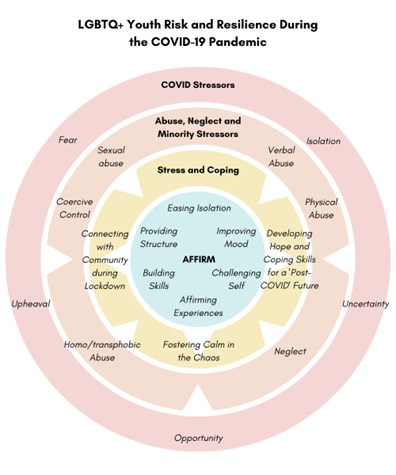Risk and resilience in a time of crisis: The experiences of LGBTQ+ youth and young adults participating in a virtual AFFIRMative CBT group (AFFIRM Online) during the COVID-19 pandemic, 2020-2022.
Craig, S. L., Brooks, A. S., Pascoe, R., Pearson, A., Xu, J., & Khudiakova, V. (2023). Risk and resilience in a time of crisis: The experiences of LGBTQ+ youth and young adults participating in a virtual AFFIRMative CBT group (AFFIRM Online) during the COVID-19 pandemic, 2020-2022. Journal of Gay & Lesbian Mental Health, 1-24. https://doi.org/10.1080/19359705.2023.2257626.
Highlights
Background
COVID-19 had major impacts on mental health and may have particularly impacted mental health among LGBTQ+ youth and young adults
LGBTQ+ youth and young adults are predisposed to mental health challenges due to minority stress, which may have been exacerbated by the pandemic and the lack of access to mental health resources
To counter this, clinicians have turned to LGBTQ+ affirmative practices, such as AFFIRM Online, the only evidence-based AFFIRMative CBT intervention for LGBTQ+ populations
Few studies have looked into the qualitative experiences of LGBTQ+ youth enrolled in such digital mental health interventions during the pandemic
Longitudinal measurement is also needed to understand LGBTQ+ youth and young adult wellbeing during the dynamic conditions of the pandemic
Study Description
The study recruited LGBTQ+ youth and young adults (n = 184, aged 14-29) from Ontario, Canada, who were fluently in English and participated in at least half of the AFFIRM Online intervention
Participants were provided a survey with four open-ended questions on Qualtrics prior to engaging with AFFIRM Online, and the same survey with two additional questions after the intervention
The four open-ended questions for both pre- and post-test were:
Please describe how COVID-19 has affected your mental health and/or overall wellbeing
Please describe how your overall stress and coping changed following the COVID-19 outbreak
Prior to the COVID-19 pandemic, please describe any experiences of abuse, maltreatment, or neglect by members of your family
Have your experiences of abuse, maltreatment, or neglect by family members changed as a result of COVID-19?
The two additional questions for the post-test were:
How has participating in AFFIRM Online affected your overall mental health and wellbeing during the COVID-19 pandemic?
Are there any other ways participating in AFFIRM Online has helped you during the COVID-19 pandemic?
Participants’ answers were analyzed, using thematic analysis, to generate domain summaries (i.e., COVID-19 stressors; abuse, neglect, and minority stressors; and AFFIRM Online), and from there, themes informed by an ecological systems approach (Bronfenbrenner, 2005)
Results
Three themes, based on the interactions between the domain summaries, were drawn from the coding (Figure 1)
Connecting with Community During Lockdown
Participants described feelings of isolation and how they used AFFIRM Online to develop a community and culturally relevant coping skills
Fostering Calm in the Chaos
Participants described feelings of uncertainty and anxiety due to the pandemic and using AFFIRM Online to manage unhelpful emotions and to add structure to their lives
Developing Hope and Coping Skills for a “Post-COVID” Future
Participants described fears for the future, reflections on the past, and using AFFIRM Online to develop coping skills to motivate a sense of hope and preparedness for the future.
Figure 1: Graphical representation of the domain summaries and themes, with outer layers denoting more distal domains and inner layers denoting more proximal domains. Directional arrows denote relationships between the domains.
Conclusions
The study highlights how COVID-19, minority stressors, and experiences of abuse and neglect interacted and caused distress to LGBTQ+ youth and young adults in Ontario—yet their participation in AFFIRM Online helped them to develop coping skills and hope
This study is the longest longitudinal qualitative study exploring the experiences of LGBTQ+ youth and young adults during the pandemic to date, allowing for dynamic contextual information about the pandemic’s course to be integrated into a richer analysis
The study also emphasizes the vital role that AFFIRM Online played in providing participants with coping processes, community, and grounding during a time of crisis
Further research should be conducted to address challenges regarding the implementation of LGBTQ+ affirmative digital mental health interventions (e.g., privacy, scalability)


